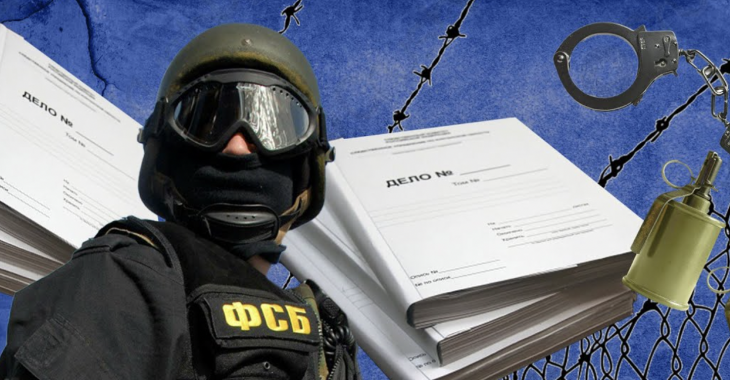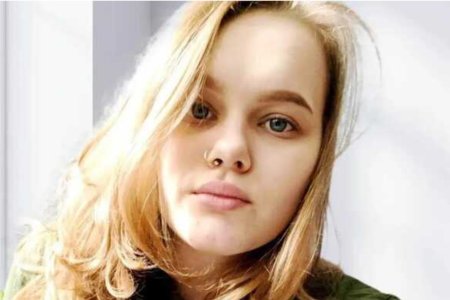
Russia began fabricating ‘terrorism’ and ‘extremism’ charges against Ukrainians shortly after it invaded and annexed Crimea, however the scale of such politically motivated prosecutions increased dramatically following its full-scale invasion of Ukraine. Verstka Media has scrutinized Russia’s notorious ‘list of terrorists and extremists’ and found that at least 89 prosecutions have been brought against Crimean Tatars or other Ukrainians from occupied parts of Ukraine for so-called ‘extremist’ or ‘terrorist’ activities since February 2022. This is four times more than over the previous four years, with the increase mainly because of the Ukrainians from Kherson and Zaporizhzhia oblasts whom the Russian invaders abducted and usually savagely tortured to obtain supposed ‘confessions’ to fictitious crimes.
It should be stressed that these are only those civilian hostages whose abduction Russia has effectively admitted through the staging of such ‘criminal proceedings’. The action number of civilian hostages is significantly higher. In some cases, Russia has concocted ‘spying’ charges. In others, they are either not admitting to holding the hostages at all, or appear to be holding them without any charges, however illegal, having been laid.
Even before the full-scale invasion, there were a huge number of Ukrainian political prisoners on the huge ‘list of so-called ‘terrorists and extremists’ published by Russia’s state ‘Rosfinmonitoring’’. Essentially all of them were recognized political prisoners whose release had been demanded by international bodies. Inclusion carries serious practical difficulties, since a person’s bank accounts are blocked, with the person allowed to withdraw only a very small amount each month.
Russia is, of course, an occupying power and, as such, has no right to apply its repressive legislation on any residents of occupied territory. In addition, the fact that Ukrainian citizens are placed on this list long before any ‘court’ verdict has been handed down indicates the sheer degradation of Russia’s ‘justice system’. Not only does it demonstrate the state’s total contempt for the presumption of innocence, but it also shows the rubberstamping role assumed by the courts. It is inclusion on the list that effectively guarantees conviction, rather than anything that happens in the courtroom.
After Russia’s full-scale invasion, access to the Rosfinmonitoring List became problematical, making the updates regularly posted by programmer Ivan Shukshin on his Telegram channel invaluable.
Verstka now estimates that Russia has initiated at least 89 criminal prosecutions, under Russian legislation on so-called ‘extremism’ or ‘terrorism’ against 76 men and 13 women from occupied parts of the Donetsk; Luhansk; Kherson and Zaporizhzhia oblasts. The largest number (37 since early 2022) have been from occupied parts of Zaporizhzhia oblast, in particular Melitopol.
The journalists have only been able to establish any details about 50 of the Ukrainians, many of whose abductions and ‘trials’ have been reported here. The list, or register, of so-called ‘extremists’ and ‘terrorists’ only provides name, birthdate, place of birth and when they were included.
Verstka reports that some of those added to the register are, in fact, prisoners of war, although others were essentially hunted by the invaders because they were known to have earlier defended Ukraine in Donbas.
See, for example, the case of Pavlo Zaporozhets, from Kherson
Russia claims tortured POW who defended Ukraine in Kherson committed ‘international terrorism’
Appaz was just 20 when he disappeared on 23 July 2022, while trying to cross from his home in Kherson oblast into occupied Crimea, to visit relatives. He was held by the FSB [Russian security service] incommunicado, without access to an independent lawyer, until October when Russia admitted to holding him. He was later sentenced to 7 years on insane charges of having “financed an illegal armed formation” under Article 208 § 1 of Russia’s criminal code. It was claimed that he had done this by sending 500 UAH (around 12 euros), seemingly as a loan, to a friend who, it later transpired, is defending Ukraine as part of the ‘Crimea’ volunteer battalion.
‘International terrorism’
Pavlo Zaporozhets is one of many Ukrainians, most civilians, whom the Russian invaders abducted, held incommunicado and tortured. The charge of ‘acts of international terrorism’ was only added, as Article 361, to Russia’s criminal code, in 2016, and had not resulted in any convictions prior to Russia’s full-scale invasion of Ukraine. An ‘act of international terrorism’ is supposed to refer to an explosion, act of arson or other actions, committed outside Russia and jeopardizing the life, health, freedom or inviolability of Russian citizens “for the purpose of violating the peaceful co-existence of states and peoples, or aimed against the interests” of Russia. You can be convicted of such a purported ‘act’ even if nobody was killed or injured. If there were fatalities, then the minimum sentence rises from 10 to 15 years’ imprisonment, with up to life imprisonment envisaged. The scope for abuse of this charge is huge, as one can even be convicted under this article for “a threat to commit such actions”, with such a ‘threat’ likely to be backed solely by ‘evidence’ or ‘testimony’ obtained by the FSB while a person was under their total control and without access to a lawyer. The minimum sentence possible (8 years) is for something called ‘financing an act of international terrorism’.
In all of the cases known about, the victims have either stated clearly that they were tortured into providing ‘confessions’, or show clear signs of giving these videoed stunts under duress. Russia does not admit to having abducted the Ukrainians, nor to have held them incommunicado, and there is either no evidence that the impugned acts even took place, or of the Ukrainians’ involvement.
All of these cases need international attention, rather than just a sentence or paragraph here. Please see and help circulate the information below.
Andriy Holubiev, Ihor Horlov; Yury Petrov, Volodymyr Zuyev and Oleksandr Zhukov
Yuriy Kayov
Yaroslav Zhuk
Torturer appears as ‘witness’ in Russia’s show trial of abducted Ukrainian Yaroslav Zhuk
Yanina Akulova
Mother of two abducted from Melitopol, tortured and held prisoner in Moscow
Vitaliy Rastorhuev
Iryna Navalna



